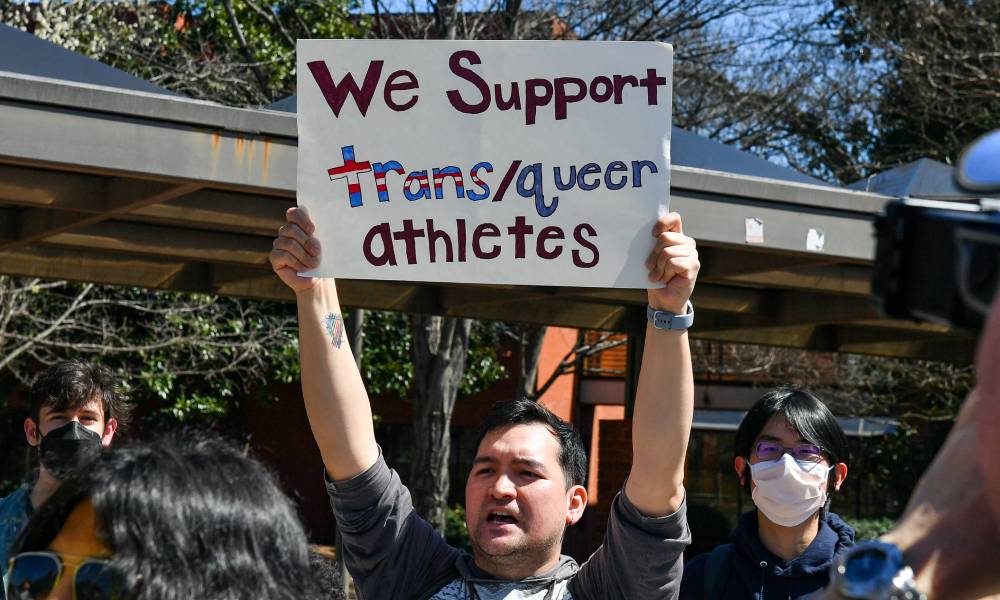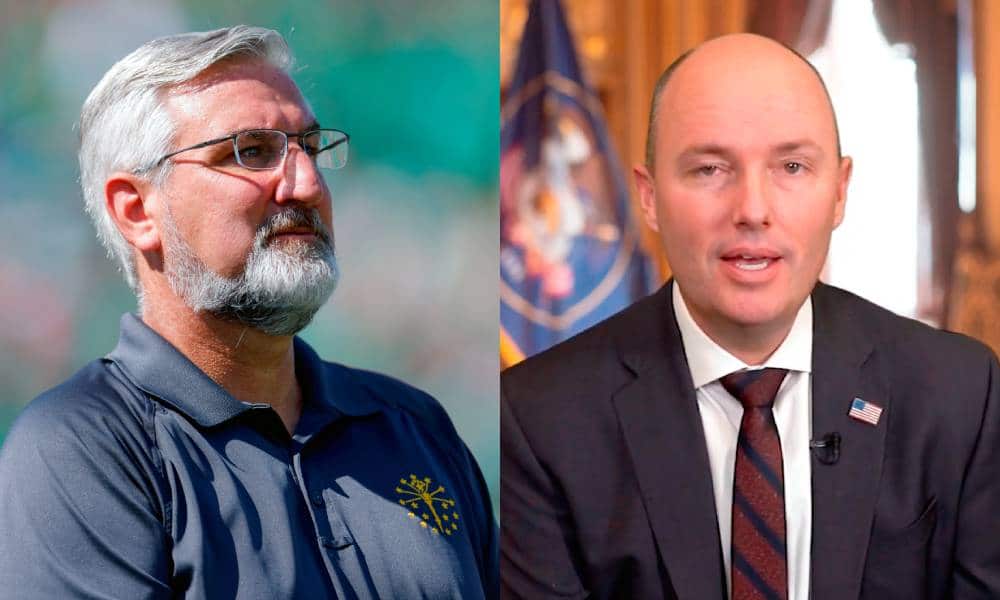Indiana governor Eric Holcomb and Utah governor Spencer Cox. (Getty/Michael Hickey/YouTube/Gov Spencer J Cox)
Two Republican governors have vetoed trans sports bans, departing from GOP leaders in other states who signed similar laws.
Indiana governor Eric Holcomb and governor Spencer Cox of Utah vetoed bills that would have banned trans girls from competing in girls’ sports at school. It’s a sharp departure from the approach to the issue than their fellow-party members as 11 states led by Republican governors have signed similar measures into law in the past couple of years.
Cox, who previously said he didn’t support the bill, explained his reasoning behind vetoing the controversial legislation in a letter addressed to leaders in the state’s House and Senate published on Tuesday (22 March).
He noted that only four of the estimated 75,000 high school students participating in sports in Utah are trans, and only one student is playing girls’ sports in the state.
Cox added that these kids aren’t “dominating or winning trophies or taking scholarships”. He said they are “just trying to find some friends”, “feel like they are a part of something” and try to “get through each day”.
“Rarely has so much fear and anger been directed at so few,” Cox wrote. “I don’t understand what they are going through or why they feel the way they do. But I want them to live.”
He also highlighted a study published in the Journal of Interpersonal Violence which found “86 per cent of trans youth” reported suicide ideation, and “56 per cent of trans youth have attempted suicide”.
“And all the research shows that even a little acceptance and connection can reduce suicidality significantly,” Cox explained. “For that reason, as much as any other, I have taken this action in the hope that we can continue to work together and find a better way.”
Cathryn Oakley, Human Rights Campaign state legislative director and senior counsel, said Cox had shown that “he sees the humanity” of trans youth targeted by the bill – “something governors in states like South Dakota and Iowa have refused to do”.
“Transgender kids across Utah, whether they want to play school sports or not, will be better off because of governor Cox’s decision today, and the [HRC] appreciates his veto,” Oakley said.
“We urge lawmakers to uphold the governor’s veto because all children in Utah deserve better than being treated as political pawns – what they deserve is to be able to have fun with their friends, exercise, and learn how to be part of a team.”
Utah legislative leaders have announced plans to meet on Friday (25 March) for an override session just minutes after Cox vetoed the trans sports ban.
House Speaker Brad Wilson said he expects the Utah legislature will have enough votes to ultimately override Cox’s veto, the Salt Lake Tribune reported.
The Associated Press previously projected that lawmakers pushing the bill might have a hard time getting the two-thirds majorities in both chambers to override the veto. With some Republicans openly opposing the ban, it would be difficult – though not impossible – to get enough votes.

Similar to Cox, Holcomb also wrote a letter to Indiana lawmakers on Monday (21 March). After a “thorough review”, he found “no evidence” that the bill sought to fix an existing issue in the state.
Holcomb claimed the current wording of the bill was too broad and “falls short” of providing a consistent statewide policy on what he described as “fairness in K-12 sports”.
He added that the bill would leave schools at risk of potential lawsuits, and he noted there are lawsuits challenging similar laws in states across the country.
“Amidst the flurry of enthusiasm to protect the integrity and fairness of women’s sports in our state – a worthy cause for sure – this bill leaves too many unanswered questions,” Holcomb wrote.
Indiana lawmakers could potentially override Holcomb’s veto when they meet on 24 May for an additional legislative day, the Guardian reported.
Katie Blair, ACLU of Indiana advocacy and public policy director, called Holcomb’s veto a “victory” that belonged to trans youth in the state who “deserve to live as their authentic selves and play the sports they love”.
“This win wouldn’t have been possible without the thousands of Hoosiers who voiced their strong opposition to state legislators and who showed up at the Statehouse to oppose this harmful bill,” Blair said. “Discrimination has no place in our state.”
